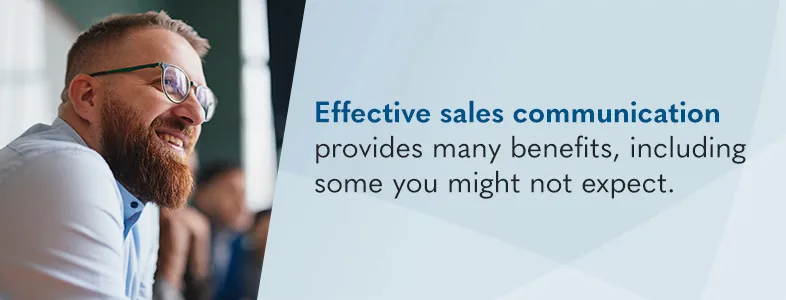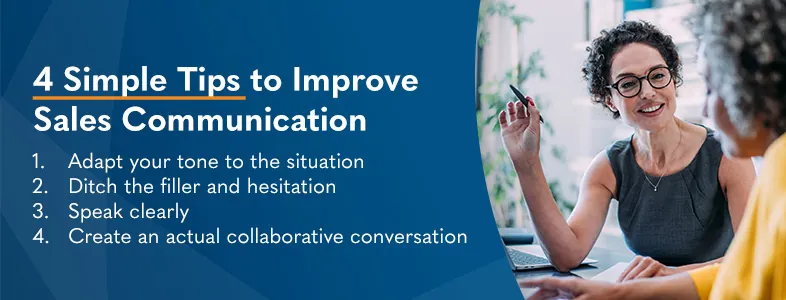How You Can Become a Better Communicator in Sales

As sales communication increasingly shifts to phone and videoconferencing, it’s critical to develop and perfect one’s voice. While complete control isn’t possible (unless you take voice lessons), there are steps to follow, both in your physical speech and in the flow of the discussion. Here we will examine the fundamentals of better sales communication, why you need it, and four tips to achieve it.
The Importance of Effective Sales Communication
In sales, better communication is crucial to building relationships. While this is a necessary first step in selling, it also helps persuade consumers to purchase products or services. It’s precisely detailing product features, actively listening to customer feedback (including body language), and proactively addressing questions and concerns.
Whether delivered verbally or nonverbally, sales communication takes various forms. These include all interactions in the sales process, from emails and phone calls to sales pitches and presentations. Done effectively, it builds understanding, respect, and rapport. Additionally, strong sales communication attracts attention, closes deals, and supports career advancement.

The Benefits of Effective Sales Communication
Effective sales communication provides many benefits, including some you might not expect. For example, Nuacom lists several interesting statistics:
- Collective language can increase the likelihood of success. This includes using “our” (55%) and “we” (35%).
- Negative openers in cold calls, such as “Is this a bad time,” decreases the likelihood of booking a meeting by 40%.
- Opening a cold call with a casual “How are you today?” increases success rates by 6.6 times.
- Silent periods of 8 to 10 percent of the total call time increase success rates.
- Top sellers speak at a pace of 176 words per minute when handling objections while average reps speak at 188 words per minute.
- Top reps limit monologues to an average of 12 seconds, approximately 35 words.
Let’s examine some intangible benefits of better sales communication:
Improve Relationships
Relationships are the heart of B2B sales. And strong relationships start with good communication. Initially, buyers and sellers approach each other with trepidation. This is natural, especially from the buyer’s point of view. Remember, they have dealt with countless salespeople, including many “typical” sellers.
Good communication starts with honesty and transparency. From first encounters, through price discussions and final presentations, speak from the heart. Don’t tell buyers what they want to hear. Tell them what they need to know, about yourself, your products and services, and how you can help them. This builds trust and leads to long-lasting, mutually beneficial relationships.
Boost Confidence
Confidence is believing in your products, services, experience, and expertise. However, in sales, there can be a fine line between confidence and arrogance. Strong communication skills give sellers the confidence to say what they mean and do what they say.
In addition, superior communication skills help salespeople display their confidence. This can inspire buyers to believe. It’s a seller whose every word and action exhibits support over selfishness. You’re not a typical seller out for quick sales. Instead, you’re a trusted partner who places their customers’ needs on par with or above your own. F
Increase Effectiveness
When salespeople establish strong rapport and build relationships, selling is easy. Buyers not only seek out camaraderie and advice. They also want to buy from you. This does not mean you slick-talked them into purchasing things they don’t need. Instead, they know you will solve their problems and alleviate their needs.
Even more, they know they’re getting a fair deal. Effective communication displays transparency. Buyers know you are a straightshooter who wants them to succeed. After all, their success is your success, a measurement that is both qualitative and quantitative. You will feel as good as your bottom line looks.
Foster Goodwill
It’s been said that those who love what they do don’t actually work. While this might be a bit of an overstatement for salespeople, the basic idea holds true. Of course, some days, some clients, and some deals are better, and easier, than others. But with effective communication, the entire process feels smoother.
This smoothness cannot be overstated. Imagine you’re a buyer. You receive countless calls and emails from sales professionals. Sellers with good communication skills stand out. Their emails and phone calls are warm and friendly, but they are not overly friendly or salesy. They are succinct, precise, and most of all, valuable.
Close More Deals
Top sellers know the incalculable value of good communication in sales negotiations. These can be long, drawn-out endeavors, especially when they involve multiple decision-makers. Unchecked, the simplest miscommunication and misunderstandings can come back to haunt sellers and derail once-sure deals.
As always in sales, the best defense is a good offense. This means validating agreements at each step in the sales process. It’s reiterating what clients say and ensuring mutual understanding. It’s gaining the solid and secure verbal agreements that lead to signed contracts.
Career Advancement
In addition to boosting the sales process, good communication pays dividends for a seller’s career. Of course, building relationships is critical. But this is not limited to prospects.
With experience, sellers learn to personalize their communication and tailor emails and phone calls to the individual client. This is about understanding one’s audience and maximizing interactions. This skill also extends to sales managers coaching teams and sales leaders inspiring organizations.

4 Simple Tips to Improve Sales Communication
1. Adapt Your Tone to the Situation
The energetic, cheery bon vivant vocal tone stereotypically associated with sales reps can work. But it’s also not appropriate for all conversations. For example, when a prospect frowns and raises an objection, a chipper voice may irritate, if not outright alienate. Instead, consider adopting a serious, yet calm tone as you probe the objection and respond with the appropriate answer.
Conversely, let’s say you have an expressive customer, excitedly talking about their great last quarter. Here, even if your default tone is solemn, you should respond with a slightly high register of congratulations or other signal of enthusiasm. Of course, avoid going over the top. Many people can detect insincerity.
2. Ditch the filler and hesitation.
Um, I was going to uh, suggest, ah, that, like, you should kinda maybe think about not using empty words and be sorta determinedish in the things you say. Joking aside, dispense with the meaningless sounds people use to fill in conversational gaps while our brain scans for the right word. It’s Public Speaking 101, but it also applies to sales discussions. You want to appear confident and poised.
As for hesitancy words (kinda, sorta, maybe, determinedish), those should go, too—unless paradoxically needed to precisely and accurately answer a question. Even in those instances, enunciate to “kind of” and “sort of.” Again, this is about inspiring confidence and illustrating competence. Using hedging language can subliminally plant seeds of doubt in the buyer’s mind.
3. Speak clearly.
This is an obvious one. But we can’t tell you how many times we’ve spoken with sales reps who mutter like they’re the next mumble rapper. No one is saying you need to have Eliza Doolittle’s post-Henry Higgins diction, but you need to speak loudly and clearly enough that the buyer can hear you correctly.
There are few things more vexing than a conversation punctuated by “What? I’m sorry? I didn’t catch that,” especially if you’re talking to the C-suite, who are frequently pressed for time.
Another aspect of speaking clearly is control. Many sales reps will, without even realizing it, speak as quickly as a toddler on a sugar binge. This can cause confusion and, like the unclear voice, require you to repeat yourself. We get it. You’re watching the clock and your adrenaline’s pumping. But slow down. Speak at a moderate speed that’s easy to understand. Here, it helps to recall the speaking pace of top sellers (176 words per minute) compared to average reps (188 words per minute) cited above.
4. Create an actual collaborative conversation.
Ever been on a call with sales or customer service that feels like a police interrogation? It’s not fun for anyone. While eliciting information is important—especially in discovery—engaging in a Q&A session doesn’t build relationships.
In fact, it turns you into a survey taker, which could be done via email or an AI chatbot on the company website. At best, it’s a missed opportunity. At worst, it’s off-putting and salesy.
Along the same lines, while you might know, or think you know, a customer’s answer to a question, resist the temptation to rush ahead and respond to your own query. You’re not a one-person theatrical performance. Give the buyer time and space to think about your question and answer it. If you were right, it’s further proof and confirmation. If you were wrong, you haven’t accidentally put your foot in your mouth or made a donkey out of yourself and the buyer.
Let Janek Performance Group Help Improve Your Team’s Communication Skills Today
Although sales reps don’t always think about how they speak or the flow of the conversation, they should. Paying attention to the details we’ve outlined here makes for a more pleasant sales discussions. This develops relationships and moves the sales process. Contact us today to help you improve your sales communication skills to achieve greater success.

Updated 8/2/2024

- Account Planning (11)
- Awards (49)
- Client Testimonial (37)
- Personal Branding (19)
- Podcast (11)
- Research (70)
- Sales Career Development (87)
- Sales Coaching (156)
- Sales Consulting (137)
- Sales Culture (170)
- Sales Enablement (354)
- Sales Leadership (109)
- Sales Management (248)
- Sales Negotiation (16)
- Sales Prospecting (125)
- Sales Role-Playing (18)
- Sales Training (235)
- Selling Strategies (263)
- Soft Skills (70)
- Talent Management (94)
- Trusted Advisor (27)
- Virtual Selling (49)
- Webinar (9)


























